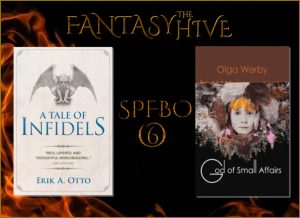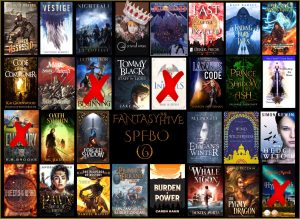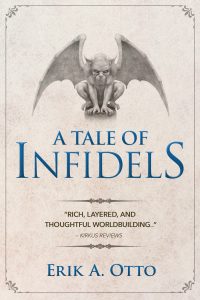SPFBO 6: First Semi-Finalist Announcement
On Wednesday, we announced our first three eliminations and revealed that our two quarter-finalists are A TALE OF INFIDELS by Erik A Otto and GOD OF SMALL AFFAIRS by Olga Werby.

The overall consensus of our judging team has been that the Fantasy Hive has had a good batch this year with a lot of books that could make a strong play for one of our six semi-finalist spots. We haven’t quite seen the extremes of innovation in the worldbuilding that we had last year with its first round entries like These Forgotten Gods by Harry Young, or Eyrie by K. Vale Nagle. However, there has been enough diversity of setting, character and theme coupled with strong writing and plot to give us quite a few books we were keen to read on with.
There’s been a lot of in-group chatter about the sometimes blurry boundaries between science fiction and fantasy and between young adult/children’s fantasy and more “grown up” (I hesitate to say adult) fantasy. More of that in later posts, but this week’s quarter-finalists make an interesting contrast between traditional epic fantasy, and something more contemporary and urban.
Our positive reaction to these two is, perhaps, a reminder that one shouldn’t judge a book by its cover. However, it is in the nature of SPFBO that judges will always delve beneath the cover. Those skimming the online bookshelves of Amazon might not.
For those thinking of self publishing we would argue that the sequence of marketing should be –
- the cover makes them pick up the book,
- the blurb makes them open the book,
- the first page/look inside makes them buy the book.
But, without further ado…
QUARTER-FINALIST #1
A Tale of Infidels
Erik A. Otto
A WORLD RIFE WITH RELIGIOUS PREJUDICE
Where cryptic prophesies of gravity-defying events and stories of mythical beasts are regular undercurrents to daily life.
POLITICAL TENSIONS ARE MOUNTING
War has sprung, troops are mobilizing, and the omens are clear.
AND NOW, INFIDELS ARE EMERGING
Sinners and traitors are being cast out. These are despicable liars. They are twisted, half-wit heathens. They are deceitful scum…
…and they’re the only ones that could save millions of lives.
Theo’s thoughts:
We have an extended prologue that lasts about 7% of the book, beginning with a trio of travelling companions meeting an enigmatic wanderer and ending with our protagonist sitting down to read a book called “A Tale of Infidels” that the wanderer has been compiling. It’s an interesting “book within a book within itself” kind of structure.
The chapters start with time stamps of dates given on two different measures. This isn’t as easy a way of locating the characters in time as authors may assume, mainly because I find myself having to flick between chapters and do some maths to work out the relative passage of time. (My calculator tells me that chapter one’s events occur 466 days before the prologue and that some event of significance has taken place in the intervening time).
The next few chapters seem to introduce us to the eponymous infidels, identified with monikers a little like high value playing cards – the truthseeker, the traitor, the imbecile. Sebastian, Hella and Darian are all in different forms of training and testing, and this gives scope for a bit of reflection on their pasts and interaction with their peers. Darian is the one I found myself engaging with most, perhaps because he seems to have the most sense of conflict with his training companion, perhaps because his first segment most clearly shows a world where things are about to go awry.
There is a nice development in the three story threads though they don’t seem to have converged yet. There is world building and backstory being dripped in, rather than clumsily exposited. The writing is generally effective but without quite shining in its own right. I took a couple of weeks’ break between reading the first 20% and writing up my notes on it – and it is to the book’s credit that I found I could catch up quite quickly, skimming through my kindle notes with the story threads reasserting themselves in my memory. At the one-fifth-of-the-way mark the characters are interestingly poised. I’m curious enough that I would be happy to read on, but just not at the stage of a desperation to read on.
Nils’ thoughts:
I really liked the cover, and particularly enjoyed the opening of A Tale of Infidels. I felt the prologue had a strong engaging start. We meet a small group of soldiers – Ron, Foxhill, Deanne, and Mackie, who are journeying to the Spoons. They encounter a strange man – unsure of whether he’s an enemy or not they decide to capture him and take him on their journey. The man then tries to escape but before he does, he warns Ron to read from The Book of Infidels. At this point I was very intrigued, and quite impressed with the gripping narrative arc.
We then meet our three main protagonists; Sebastian, Hella and Darian. I was most drawn to Darian’s character as he is a cadet in the Thelonian army and his narrative arc was the most interesting. He becomes entangled in a war between the Thelonian soldiers and the Sambayans, another race known as savages. I very much liked Darian’s character. He displays some traits associated with autism, which is always great to have some representation included, and is often quite the outsider because of his behaviour. I had a lot of sympathy for him and wanted to discover more about him and his brothers.
The only slight problem I had was that Matteo’s Lands, the world in which this book is set, is one deeply embedded with religion and so with any land that is entrenched with religious beliefs, in turn follows prejudices. There was a line where Darian mentions that the Sambayans smell of their ‘pungent food’ and this didn’t sit right with me, it’s borderline a racist slur. I’m hoping this is a view that the character will be shown as completely ignorant and will learn and grow.
I also personally think the writing could do with some polishing. I spotted quite a few modern/odd word choices, for example Americanisms like ‘bangs’ and ‘goiter’, then there were slang terms like, ‘gob’, snot’ and ‘lobbed’ which felt completely out of place.
However I reached the 27% mark and was still compelled to read more to find out about the gargoyles and other lands which will seemingly be explored in the rest of the novel.
Beth’s thoughts:
The cover is very plain and simple, it doesn’t give very much away at all. As a judge I like that it doesn’t try to sway my expectations in any particular direction, but that very thing would work against me as a reader.
I felt A Tale of Infidels was a great example of one of those books that drops you into the midst of the story with no warning and little exposition, and manages to pull it off. I think the key is keeping it simple to start, and then building up the complexity of your world. Here, although lengthy, the prologue follows a group of characters as they attempt to reach a destination, but they are lost and come across a mysterious character. Our protagonist appears to be more than he seems. There’s plenty of mystery before we’re then transported into the framed narrative.
Like Theo, I really struggled with the date format. It provides too much information, detail that we’re not yet familiar with to be able to decipher the differences in time. Unless, apparently, you’re Theo of course.
Again like Theo, and also Nils, I really enjoyed Darian’s perspective. However chapter one follows a character called Sebastian and he was not a great first impression for the story, his character was stuffy and I struggled through this chapter. However, the rest certainly picked up and, despite the choice of names – it was a little jarring to be reading a character called Bronte – the writing was very good and the character portrayal excellent. Early on in this book there is clear definition between the characters; the protagonists have definable personalities, as do the secondary characters.
I also had the impression that this might turn out to be a regressed society with forgotten technologies/magic kind of deal and I love those. I would have happily read on, and I feel it’s definitely up there as one of the stronger books of our batch – we just had such a lot of strong books in our batch unfortunately, and judging the whole as a team means the ranking system speaks for itself!
Filip’s thoughts:
A wonderful cover, minimalist in all the right ways; an easy to read text, a kind of This never quite gripped me in just the right way. The prologue was a little too long, and though the story-within-a-story set-up is an intriguing proposition, the first twenty percent simply didn’t offer . I can appreciate the prose, which is of fine quality, but most of the characters left no great impression on me. I suspect A Tale of Infidels gets better the more you read of it, but the first twenty percent did not grab me well enough to persuade me to keep going. I might someday revisit it, but other books awoke in me a fascination that was absent when I perused A Tale of Infidels.
P.S. Incidentally, this title is one of two books that deal with infidels among our batch — can you guess which the second one is?
Julia’s thoughts:
Despite really liking the cover for some reason, despite the simplicity of it, this one didn’t work as well for me as it did for some other judges. To me the start of the book felt a bit contrived and artificial to me, if that makes sense to say about a fantasy book. More like a premade D&D campaign than an actual fresh story in a way?
The characters didn’t really stand out for me, they just didn’t really feel unique. On top of that some actions and decisions also didn’t feel natural to the story, but rather like someone in the back pushing a button to make characters do X or think Y.
Don’t get me wrong, it isn’t an actually bad book, or it wouldn’t have made it into our “quarter finals”, I just think it could have been a lot better than it is with the potential I see there, Because the worldbuilding and plot are definitely intriguing enough to make it a “could have read on” book!
SEMI-FINALIST #1
God Of Small Affairs
Olga Werby
Jon Uolan is the grandson of First Nation tribe elder. His assignment is to bring home a god. Not the omnipresent god or the god that set the weight of the proton and the rate of universal expansion, but rather an everyday kind of god, the god that lives among her people, the god of small affairs, Ay-Tal Blue.
An easy assignment turns into a nightmare when Ay-Tal gets accidentally shot and Jon becomes a suspect in a murder investigation. And while Jon is in prison, a huge earthquake and tsunami wipe out his home village. His grandfather dies in the disaster. With his people scattered and living apart, the whole tribe might cease to exist. The new generation just is not interested in the old tribal ways. Ay-Tal is no longer there to help and guide them.
What is Jon to do? How will a new path into the future shape the people who got mixed up with a god of small affairs?
Theo’s thoughts:
This is an interesting one. I put off reading Senlin Ascends for a long time because the premise of man searching for lost wife just seemed too painful and earnest a read, but once I got into it I realised the book was about much more than that. In the same way God of Small Affairs initially alarmed me as I thought this is “following violent incident on train couple must hack their way cross country to safely deliver essential documents” but actually I’m 21% in and the story has flowered out in unrecognisable ways from that root cause and I’m really quite keen to read on now.
It’s an urban fantasy set in a contemporary world with an intriguing take on the “gods walk amongst us” theme, with the emphasis very much on the walk! – a kind of mix of Gaiman’s American Gods and Pratchett’s Small Gods, though Werby doesn’t play it for laughs. The writing could be stronger and there are places where I think Werby switches PoV just because it is the easy way to share what’s in a character’s head. I think there are probably better ways to share the less than savoury or pseudo savoury motivations of minor characters. But it’s hit some interesting contemporary societal notes with a good fantasy hammer. I genuinely can’t tell which way it’s going to go next, and I want to know.
Nils’ thoughts:
First of all, I really dislike the cover. If I’m being honest the cover actually completely put me off from wanting to read this book. I’m sorry, but that face in the centre is awful and somewhat creepy, the colours are bland and the typography is boring. Had it not been for this competition I’d have never have given this one a chance.
However, I’m so happy that I did – I was pleasantly surprised at how much I enjoyed the first 24% of this story.
The opening chapter worked well to hold my interest, although for some reason I had the impression at first that the book was set in the Victorian period, but it is actually set in modern day and is an urban fantasy. This slightly disappointed me, I’m not really taken by urban fantasy or a modern setting but I was compelled enough to read on. The story revolves around a shapeshifting god and its protector. When the characters reached a certain town, the events became a bit sinister and took very unexpected turns, as Theo mentions. It was at this point where I became much more hooked.
Overall I felt the prose was well done, the characters were fleshed out, which was nice to see, and the theme of ‘gods guiding our paths’ was very appealing. I do hope the setting moves on to Alaska, and we get more from the Inuit culture, as I love learning about their mythology and way of life.
It just goes to show how great the SPFBO competition is – I had the opportunity to read something I never would have picked up by my own choice and I was proven wrong because God of Small Affairs has such an enticing opening and I’m actually eager to read the rest.
Beth’s thoughts:
I really dislike the cover. It’s not until it’s full screen that you can see the details of the trees, insects, and sledge. Otherwise it just looks like a face peering out of brown and it’s not at all eye-catching.
I’m honestly not entirely sure what to make of this book, but something I can certainly say is that it’s very different to the standard fayre and that really intrigues me.
There were a number of things in the opening 20% I did not like; certain comments such as: “She was almost thirty years his senior, but he thought she was still very beautiful.” Old but beautiful, as if old is a signifier that usually you wouldn’t be beautiful. I also did not like the fixation on what colour clothes the ‘child’ was wearing, how it come up from the point of view of a couple of different characters that it was somehow cruel and inappropriate that a boy child was wearing girls’ clothes. The plot at this stage felt quite messy at times, like a character’s motivations were being written organically rather than planned ahead; for example, there was pressure to get Jon and Al to Aunt Ada for help, but once with Aunt Ada, quite sinister things become apparent and then there’s the concern that they can’t get away. I couldn’t help but feel, well, why take them there to begin with?
Despite all this, the curious figure of Al, this god that Jon is attempting to get back to his people, was intriguing enough that I wanted to continue reading. I have some trepidation but I’m hoping it will pay off.
Filip’s thoughts:
The title, God of Small Affairs, was the first among our batch of thirty that jumped out to me. I recall writing in our judges’ chat, “That one’s mine!” Seeing the cover, however, did take away from my enthusiasm. If there’s one piece of advice I might give the author, it would be this: Such a phenomenal book is done a disservice by a cover that makes trashy seventies fantasy covers look like high art. It might very well be the single greatest factor in keeping people from experiencing what is a fascinating story, so far.
Indeed, this is one I am eager to read on. Plenty of mystique in what begins as a private story, but by the last chapter of the opening quarter blossoms into something with considerable stakes. The dialogue and characters both have that all-important quality of veracity about them.
Set on an Earth where humans seem to be guided by gods, this novel leaves a Stephen King-esque impression, of existential mystery coupled with very common human misery, domestic violence, and a few characters who play at normalcy, while being anything but.
I have high expectations of God of Small Affairs, now that it’s our very first semi-finalist, and if this opening is anything to go by…
Well, time will tell.
Julia’s thoughts:
I hate the cover. The first few pages are also a bit weird, with a picture of a spider and some illustrations, so I didn’t go in with high hopes to be honest.
When I finally got to the actual story it was also quite strange and had me raise an eyebrow thinking “Oh dear, will I even make it to the 20% I want to try for each entry…” but I kept reading. And ever so slowly the story and characters started to grow on me.
Without even realising, I went from “what the heck is this?” to “Oh no, I have to leave the house now so I need to stop reading!” somewhere around the 9% mark of the book.
The story is unique, and even though it feels a bit simple at times, it wasn’t in an annoying way to me, like some of the books we cut earlier this week, but rather in a nice refreshing fairy tale kind of way. I love the idea of the god just being a part of the society, and the different lifestyle and setting that contrasts well with our “normal western” world the main characters travel through.
I found the characters engaging, the tone pleasant and the plot intriguing along with some new Points of View to consider – and I can’t wait to read more of it!
Congratulations to GOD OF SMALL AFFAIRS – our first semi-finalist!

Batla, R. J. – Fire Eyes Awakened
Borodin, Stas – Magic, Sorcery and Witchcraft
Brooks, E. B. – Emissary
Christion, Alexzander – By the Hand of Dragons: AlinGuard
Coffelt, J. J. – Nightfall: Blessing of Fury Book 1
Ford, Angela J. – Pawn
Gately, Samuel – The Headlock of Destiny
Gonzalez, Selina R. – Prince of Shadows and Ash
Greenwood, Kai – Code of the Communer
Hahn, Caren – Burden of Power
Haskell, Megan – Forged in Shadow
Kannon, Marc Vunj – Unbinding the Stone
Kerr, Jake – Tommy Black and the Staff of Light
Kewin, Simon – Hedge Witch
Macdonald, Meg – Oathsworn
Marek, Marco – Hyperearth
Otto, Erik A. – A Tale of Infidels (*quarter-finalist)
Padgett, M. J. – Eiagan’s Winter
Porta, Dustin – Whalemoon
Prior, Derek – Last of the Exalted
Ramsey, Kate – Finding Fairy Tales
Roberts, Antonio – Vestige: Ride of the Pureblood
Rogers, Madolyn – The Copper Assassin
Rowntree, Suzannah – A Wind from the Wilderness
Secchia, Marc – The Pygmy Dragon
Thompson, J. E. – A New Beginning
van Orman, Sharon – Lazarus Code: A First Family Sage
Werby, Olga – God of Small Affairs (*semi-finalist)
Whitecastle, Timandra – Queens of the Wyrd
Zangari, Robert – A Prince’s Errand



[…] Blog-Off and placed Semi-Finalist. You can read the bad and the good reviews of this story here Fantasy Hive. (PS: The judges really hated the […]
Aw, it’s nice to be remembered =] And this year has a lot of exciting books competing! I can’t wait to see what you think of Whalemoon by Dustin Porta. Between the sea shanties and shark selkie, that book had me hooked.